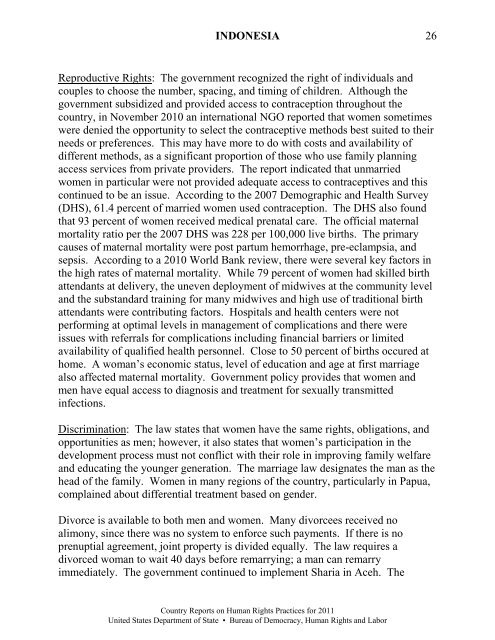INDONESIA EXECUTIVE SUMMARY Indonesia is a multiparty ...
INDONESIA EXECUTIVE SUMMARY Indonesia is a multiparty ...
INDONESIA EXECUTIVE SUMMARY Indonesia is a multiparty ...
You also want an ePaper? Increase the reach of your titles
YUMPU automatically turns print PDFs into web optimized ePapers that Google loves.
<strong>INDONESIA</strong> 26<br />
Reproductive Rights: The government recognized the right of individuals and<br />
couples to choose the number, spacing, and timing of children. Although the<br />
government subsidized and provided access to contraception throughout the<br />
country, in November 2010 an international NGO reported that women sometimes<br />
were denied the opportunity to select the contraceptive methods best suited to their<br />
needs or preferences. Th<strong>is</strong> may have more to do with costs and availability of<br />
different methods, as a significant proportion of those who use family planning<br />
access services from private providers. The report indicated that unmarried<br />
women in particular were not provided adequate access to contraceptives and th<strong>is</strong><br />
continued to be an <strong>is</strong>sue. According to the 2007 Demographic and Health Survey<br />
(DHS), 61.4 percent of married women used contraception. The DHS also found<br />
that 93 percent of women received medical prenatal care. The official maternal<br />
mortality ratio per the 2007 DHS was 228 per 100,000 live births. The primary<br />
causes of maternal mortality were post partum hemorrhage, pre-eclampsia, and<br />
seps<strong>is</strong>. According to a 2010 World Bank review, there were several key factors in<br />
the high rates of maternal mortality. While 79 percent of women had skilled birth<br />
attendants at delivery, the uneven deployment of midwives at the community level<br />
and the substandard training for many midwives and high use of traditional birth<br />
attendants were contributing factors. Hospitals and health centers were not<br />
performing at optimal levels in management of complications and there were<br />
<strong>is</strong>sues with referrals for complications including financial barriers or limited<br />
availability of qualified health personnel. Close to 50 percent of births occured at<br />
home. A woman’s economic status, level of education and age at first marriage<br />
also affected maternal mortality. Government policy provides that women and<br />
men have equal access to diagnos<strong>is</strong> and treatment for sexually transmitted<br />
infections.<br />
D<strong>is</strong>crimination: The law states that women have the same rights, obligations, and<br />
opportunities as men; however, it also states that women’s participation in the<br />
development process must not conflict with their role in improving family welfare<br />
and educating the younger generation. The marriage law designates the man as the<br />
head of the family. Women in many regions of the country, particularly in Papua,<br />
complained about differential treatment based on gender.<br />
Divorce <strong>is</strong> available to both men and women. Many divorcees received no<br />
alimony, since there was no system to enforce such payments. If there <strong>is</strong> no<br />
prenuptial agreement, joint property <strong>is</strong> divided equally. The law requires a<br />
divorced woman to wait 40 days before remarrying; a man can remarry<br />
immediately. The government continued to implement Sharia in Aceh. The<br />
Country Reports on Human Rights Practices for 2011<br />
United States Department of State • Bureau of Democracy, Human Rights and Labor
















